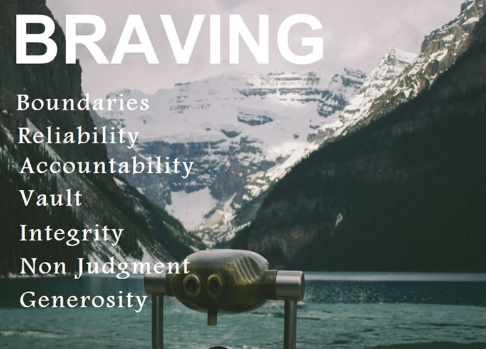Dare You Be Brave Enough to Be Vulnerable Lessons from Brene Brown

Originally published by Leigh Kendall – 18th September 2018
Recently I had the privilege of attending a webinar ‘Daring Leadership in Healthcare’ led by Brene Brown. I’ve read Brene’s books, and watched her TED talks and so jumped at the opportunity offered by Healthcare Improvement Scotland. Listening to her rich Texan tones offering her insights, answering participants’ questions with genuine warmth and candour, was a real treat.
Brene suggests that the biggest challenge leaders have is not skills or knowledge, but the courage to be vulnerable.
Why is this important, especially in healthcare? Being vulnerable means accepting that we don’t know all the answers, that sometimes we might get things wrong (or, at least, not completely right), that we need the support of others. Accepting this requires courage because culture can often teach us, wrongly, that in order to be successful we need to know the answers, always be right, and be some kind of self-sufficient superhero.
Crucially, we need to to support one another. We need to remember that we are all humans – and acknowledge that for all human beings are (individuals with our own feelings, hopes, fears, experiences, anxieties, aspirations). As Brene said, “If we can’t change how we show up for each other, we can’t change how we care for patients.”
Brene suggested these are the top 10 challenges for managers:

How many of these do you recognise, either in yourself as a manager or in your managers?
An undercurrent that runs throughout all of these points is the ability to have difficult conversations. Brene said: “Clear is kind – unclear is unkind – we think we’re being kind by avoiding difficult conversations when we’re actually prioritising our own discomfort. Being courageous isn’t mutually exclusive with politeness and kindness.”
In other words, difficult conversations don’t have to be made more unpleasant by being rude, bullying, or unkind. The Horizons team’s recent training workshop with the Applied Influence Group showed us that it is possible to reach an understanding even with a military enemy: have an open conversation, ask questions, listen to the answers, and seek to understand.
‘Action bias’ is interesting – it relates to the urge to do something, anything to solve an issue rather than stopping to think about it. Stopping to think about it perhaps involves having uncomfortable conversations, making it feel easier to just keep on going, irrespective of whether or not it’s the right path.
The pursuit for perfection is the opposite of striving for excellence, said Brene, because it holds the myth of avoiding shame and blame. Shame and blame, and the impossible quest for perfectionism are topics that often come up in The School for Change Agents. This creates a culture of fear, of having open candid conversations when mistakes are made (mistakes will always be made, we’re human) – and most importantly, the facility to learn from those mistakes.
The ability to engage in difficult conversations is sometimes complicated by trust issues. Brene suggests ‘BRAVING’ as a means of identifying what is causing those trust issues.

And ask yourself: do you assume positive intent about other people? Are you generous about others, rather than make negative assumptions? This helps build trust.
This is the way we can work together in healthcare, for the benefit of our colleagues, and for our patients. We need the courage to be vulnerable, to not prioritise our own discomfort. We need to pursue excellence while understanding that part of this is learning from mistakes. We need to be always be learning, to ask questions, to be curious.
I’ll leave you with Brene’s words:
“Stay curious – it’s the courage superpower!”
The definition of integrity: choosing courage over comfort; choosing what is right over what is fun, fast or easy, and choosing to practice our values rather than simply profess them.
TWEETS ON THIS SUBJECT
